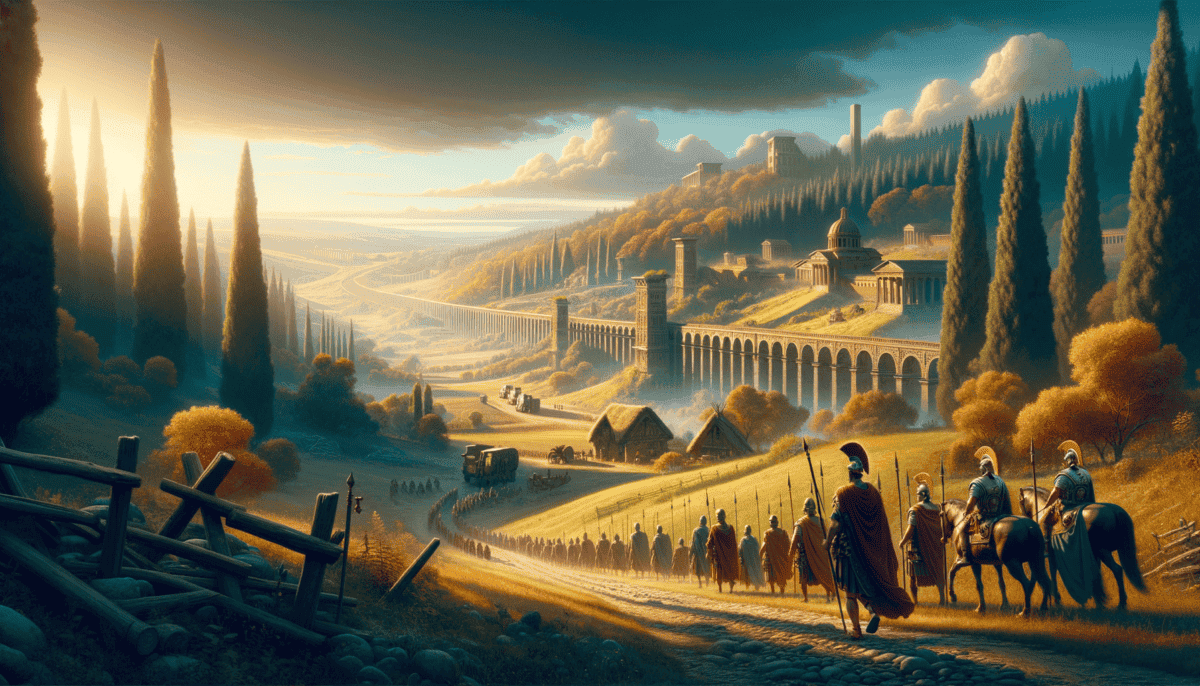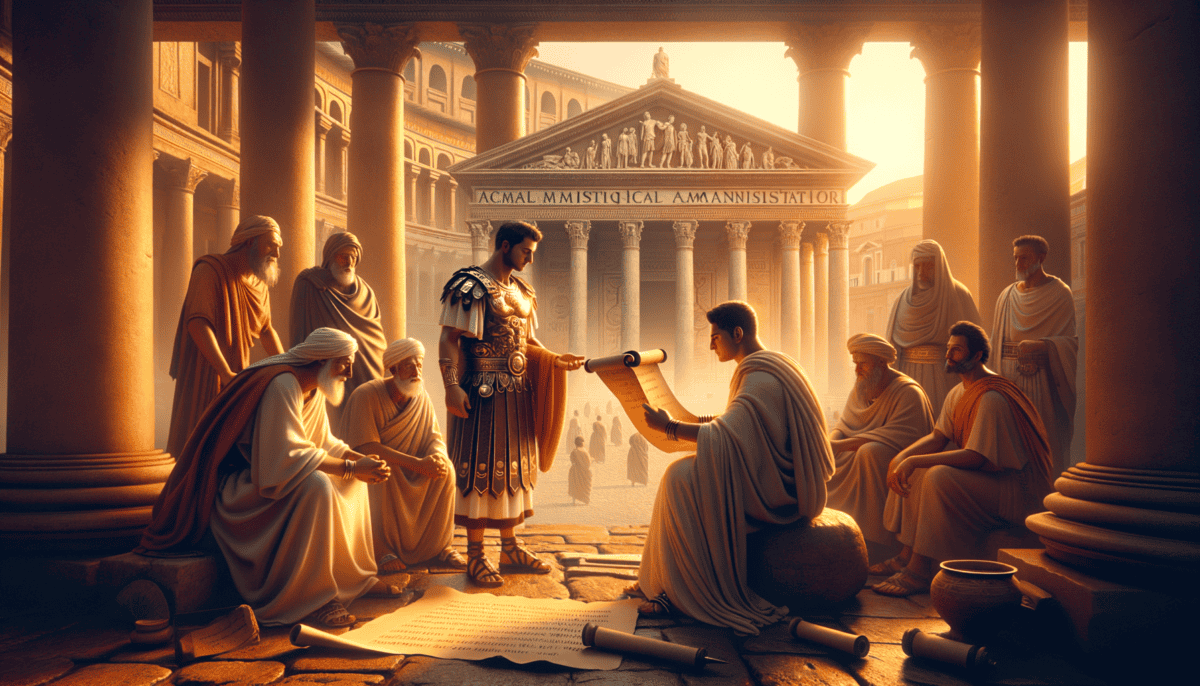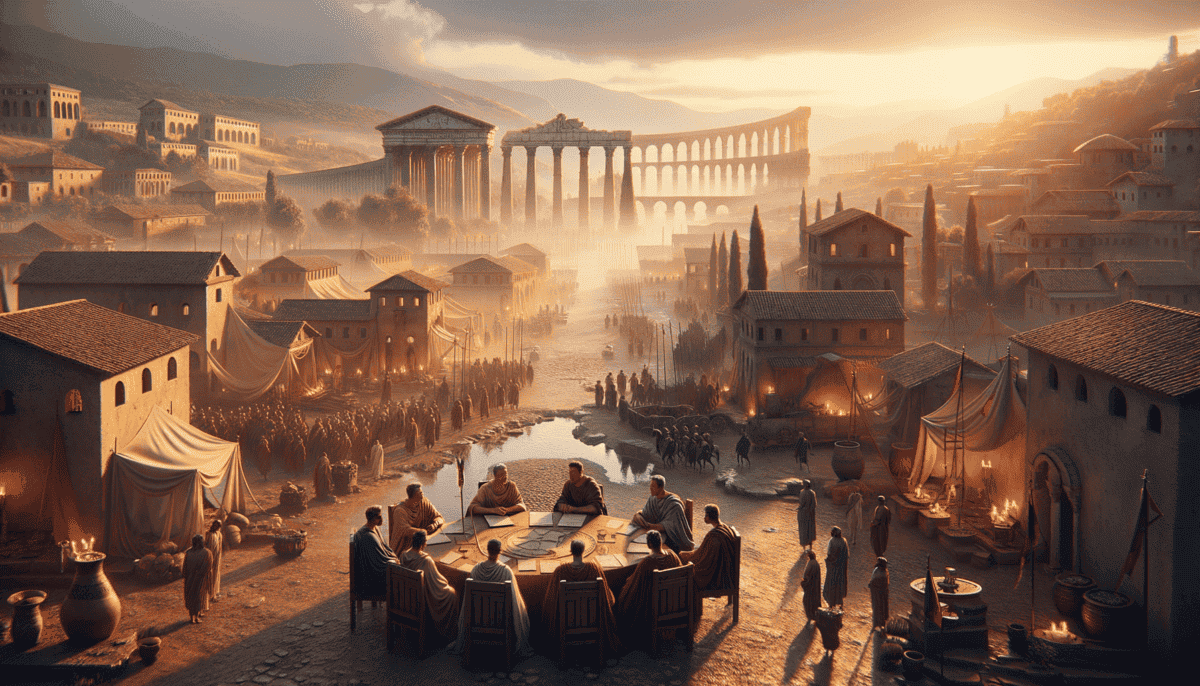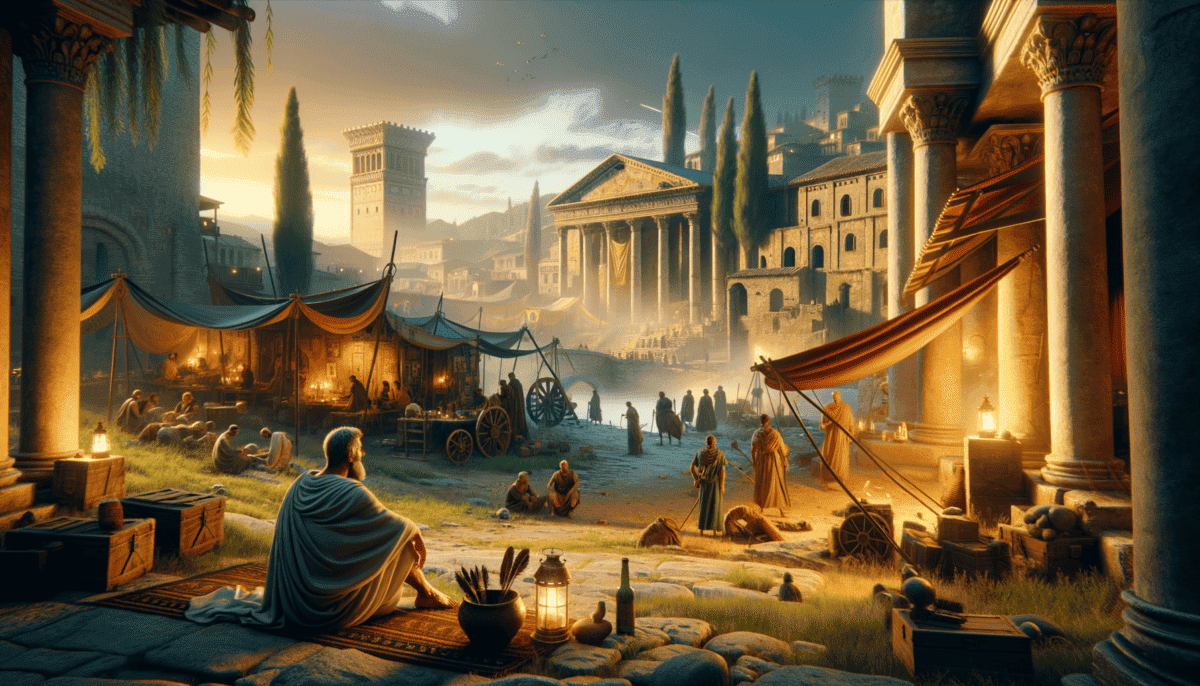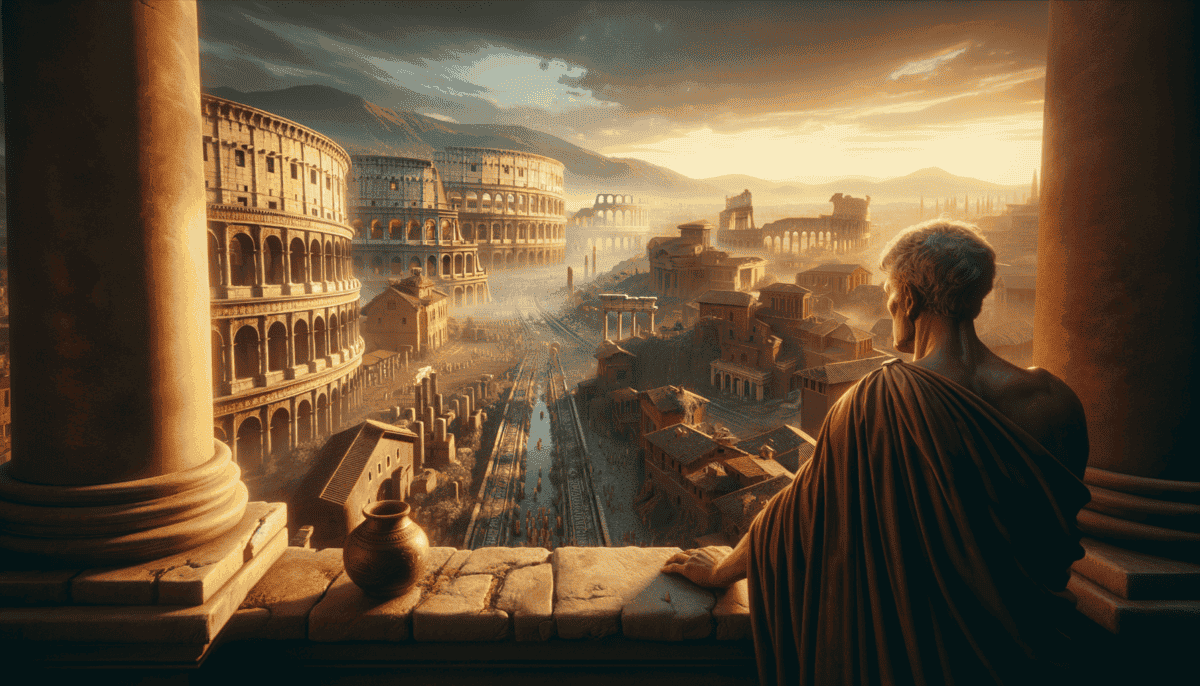The Spark of Empire
Young Lucius stood at the edge of Rome’s walls, watching the sun rise over the seven hills. His worn sandals kicked up dust as he shifted from foot to foot. At just sixteen, he was ready to join the Roman army.
“Father, tell me again about how Rome grew so big,” Lucius asked, turning to the weathered man beside him.
Fun Fact: Rome started as a tiny town by the Tiber River. It was about as big as your school playground!
Marcus, Lucius’s father, smiled and pointed to the bustling city below. “Son, Rome wasn’t always this grand. When I was a boy, it was much smaller. But our people were smart and brave.”
“How did we make friends with other cities?” Lucius asked, his eyes wide with curiosity.
“Sometimes we fought battles,” Marcus explained. “But more often, we made deals. We told other towns: ‘Join us, and we’ll protect you. We’ll build roads to connect us. Your people can become Roman citizens too!'”
The First Steps of Growth
Lucius watched as merchants pushed carts loaded with goods through the city gates. People spoke many different languages – not just Latin. Some wore colorful clothes from far-away places.
“Rome grows stronger because we welcome new friends,” Marcus said. “See those people? They came from towns that joined us. Now they’re Romans too!”
The young boy noticed something interesting about the soldiers marching past:
- Some had dark skin from Africa
- Others had red hair from the north ⚔️
- Many spoke different languages ️
- But they all wore the same Roman armor ⚔️
“Tomorrow, I join the army,” Lucius said proudly. His father nodded, placing a strong hand on his shoulder.
Important: Romans were good at making new friends and teaching them Roman ways. They shared their laws, language, and customs.
“Remember, son,” Marcus said softly, “being Roman isn’t just about fighting. It’s about building things that last – roads, buildings, and friendships with other people.”
That night, Lucius could hardly sleep. He imagined all the places he would see and the people he would meet. As he drifted off, he dreamed of helping Rome grow even bigger, not just through battles, but by making new friends and building new things.
The next morning, as Lucius put on his new soldier’s uniform, he remembered his father’s words. He wasn’t just joining an army – he was becoming part of something much bigger. He was joining the story of Rome itself.
Roads of Conquest
The morning sun beat down on Lucius as he marched with his legion into Gaul. His sandals now pressed against a smooth stone road – one that Roman soldiers had built with their own hands.
“Why do we spend so much time building roads?” asked Marcus, a young soldier marching beside Lucius.
Road Fun Fact: Roman roads were so well-built that many still exist today – that’s over 2,000 years old! They’re as old as 10,000 birthdays!
Lucius smiled, remembering what his commander had taught him. “Roads are like magic lines that connect everyone in our empire. They help us move fast and carry food and things to people who need them.”
Building the Famous Roman Roads
The soldiers stopped at a construction site. Lucius watched as workers laid out the road step by step:
- First, they dug a big hole ️
- Then they put down big rocks
- Next came smaller stones and sand
- Finally, they added flat stones on top ️
“Look how straight our roads are!” Lucius pointed proudly. “They’re like lines drawn with a giant ruler.”
“All roads lead to Rome,” his commander said with a smile. “That means anyone can find their way to our great city!”
Meeting New Friends and Foes
As they marched deeper into Gaul, they met Celtic people with bright red and yellow clothes. Some were friendly, but others didn’t like the Romans coming to their land.
Important: Romans tried to make friends with local people by sharing their ideas and learning about their ways too.
“Hello! Bonjour!” Lucius called out to a Celtic family, using their language. He had been learning it from a friendly Celtic trader. The family smiled and waved back.
One day, they reached a Celtic village where people looked scared. “Don’t worry,” Lucius told them kindly. “We’re here to build roads and help you join our big Roman family.”
The Power of Roads
At night, sitting around the campfire, Lucius wrote in his diary: “Today I learned that roads do more than help us walk places. They bring people together, like a big bridge of friendship.”
He watched as Roman traders shared bread with Celtic families, and Celtic children taught Roman soldiers their games. The road they built wasn’t just stones – it was a path to new friendships.
A Celtic chief approached their camp one evening. “Your roads are strong,” he said through a translator. “Perhaps we can be strong together too.”
Lucius smiled, knowing that this was how Rome grew – not just by building roads, but by building trust. As he fell asleep under the stars, he dreamed of all the new places these roads would take him, and all the new friends he would make along the way.
The Art of Leadership
Five years had passed since Lucius helped build the great roads. Now he sat in a wooden chair in his new office in Gaul, looking at maps on his desk. He wasn’t just a soldier anymore – he was a governor!
Fun Fact: Roman governors were like mayors today. They helped take care of cities and made sure everyone followed the rules.
“Good morning, Governor Lucius!” called Julia, his Celtic helper. She spoke perfect Latin now, but still wore her colorful Celtic clothes.
Learning New Ways
Lucius smiled as he watched Celtic and Roman children playing together in the town square. They were teaching each other games and sharing snacks.
“The best way to make friends is to learn from each other,” Lucius told his staff. “We must respect their ways just as they learn ours.”
Every morning, Lucius visited the local market. He learned to say “hello” and “thank you” in Celtic. The shopkeepers taught him about their favorite foods and stories.
Making Fair Rules
In his big meeting room, Lucius sat with both Roman and Celtic leaders. They worked together to make rules that were fair for everyone.
Important Rule: Everyone could speak their own language and follow their own beliefs, as long as they also followed basic Roman laws.
“Why do you let us keep our customs?” asked Brennus, a Celtic chief.
“Because happy people make good neighbors,” Lucius replied with a smile. “And good neighbors make a strong empire.”
Building Together
The town was growing! They built new things that mixed Roman and Celtic styles:
- ️ Roman-style buildings with Celtic decorations
- ♂️ Bath houses where everyone could meet
- Schools where children learned both languages
- Temples that honored both Roman and Celtic gods
“Look how our city shines!” Julia exclaimed one day. “It’s not just Roman or Celtic anymore – it’s something new and special.”
Solving Problems Together
Sometimes there were arguments. One day, a Roman merchant and a Celtic farmer had a fight about land.
“Let’s talk about this calmly,” Lucius said. He listened to both sides and helped them find a fair solution. They ended up sharing the land and becoming friends!
Leadership Lesson: Good leaders listen to everyone and help people work together.
At night, Lucius wrote in his diary: “Today I learned that being a good leader isn’t about telling people what to do. It’s about helping them find ways to work together and make things better for everyone.”
As he walked home under the stars, he saw Roman and Celtic families sharing dinner together. Children played games in both languages, and the town felt peaceful and happy.
A small Celtic girl ran up to him. “Governor Lucius! Want to learn our new game? It’s part Roman and part Celtic!”
Lucius smiled and joined the children’s game. This was what made him most proud – not the buildings or roads, but the way people were coming together to create something new and wonderful.
Storms of Change
️ Dark clouds gathered over the province as Lucius stood at his window. A messenger had just arrived with troubling news – there was an uprising in the eastern territories!
Warning Signs: People in the east were unhappy about new taxes and wanted to keep more of their old ways.
The Bad News
“Governor Lucius!” Julia burst into the room. “The eastern villages are refusing to send food to Rome. They say the taxes are too high!”
Lucius frowned. He remembered being a young soldier, thinking that force was the answer to everything. Now he knew better.
“Sometimes the strongest weapon is a kind word and a willing ear,” he said softly.
A Different Way
Instead of sending soldiers right away, Lucius decided to travel east himself. He took Julia and a small group with him.
“But sir,” his guard captain protested, “shouldn’t we bring more soldiers?”
“We come as friends first,” Lucius replied. “Let’s try talking before fighting.”
Smart Thinking: Lucius knew that fighting should be the last choice, not the first.
Meeting the People
In the eastern village, angry faces greeted them. An old woman stepped forward.
“Why should we give half our food to Rome?” she demanded. “Our children are hungry!”
Lucius listened carefully. He learned:
- The harvest had been bad this year
- Many families didn’t have enough food
- People felt Rome didn’t understand their problems
- They wanted to be heard and respected
Finding Solutions
“I hear you,” Lucius said. “Let’s work together to fix this.”
He made some changes:
New Rules:
• Lower taxes when harvests are bad
• Local people help decide how to use tax money
• More help during hard times
Working It Out
“See?” Julia said to the villagers. “Rome can listen and change too!”
The old woman smiled for the first time. “Maybe we can work together after all.”
But not everyone was happy. Some young men still wanted to fight.
“If you choose peace,” Lucius told them, “we can build something better together. If you choose war, everyone loses.”
A New Beginning
Most people chose peace. They worked with Lucius to make things better:
Romans taught new farming methods
️ Villages got help building stronger homes
Local leaders joined the governor’s council
One evening, as Lucius watched children playing in the village square, the old woman brought him some bread.
“You know,” she said, “when you first came, I thought you were just another Roman boss. But you showed us that Rome can be different.”
Lucius took the bread with a smile. “And you showed Rome that listening works better than fighting.”
As he rode home, Lucius thought about how close they had come to war. Sometimes the bravest thing wasn’t drawing your sword – it was reaching out your hand in friendship.
That night, Julia found him writing in his diary: “Today I learned that a true leader must have the courage to choose peace when others call for war.”
Hearts and Minds
As the sun rose over the hills, Lucius sat in his garden. He was thinking about all the changes he had seen in his life serving Rome.
A Special Letter
“Governor!” Julia rushed in with a scroll. “A letter from the girl whose father we helped last month.”
The Letter Said:
“Dear Lucius, thanks to you, my father’s farm is doing well now. I never thought I’d say this, but I’m glad the Romans are here.”
Lucius smiled, remembering the angry farmer who had once refused to speak to any Romans. Now his daughter was learning to write in Latin!
Stories of Change
“Tell me about the people you’ve met,” Julia asked, sitting down beside him.
Lucius thought back to all the faces he’d known:
- The wise elder who taught him local healing plants
- The little girl who now studied in a Roman school
- The farmer who learned new growing methods
- The local teacher who shared stories of her people
Different Views
“Sometimes I wonder,” Lucius said, “if we’re doing the right thing by being here.”
“Every coin has two sides,” replied Julia. “Just like Rome has brought changes – some good, some hard.”
Changes People Faced:
• Learning new ways to live
• Speaking different languages
• Following new rules
• Missing old traditions
A Special Visit
That afternoon, they visited the local market. A woman recognized Lucius.
“You’re the Roman who saved my son!” she called out. “Remember? When he was sick last winter?”
Lucius remembered sending the Roman doctor to help her family.
Working Together
“Look there,” Julia pointed to a busy shop. “That’s new!”
The shop showed the best of both worlds:
Local pottery painted with Roman designs
Traditional food served in Roman style
Clothes that mixed both fashions
Hard Truths
But not everything was perfect. An old man approached Lucius.
“My grandson doesn’t know our old songs anymore,” he said sadly. “He only wants to speak Latin.”
Important Lesson: Change can bring good things, but it’s important not to forget the old ways completely.
Making Things Better
That evening, Lucius made a decision. He called a meeting with local leaders.
“Let’s start a special school,” he suggested. “Children can learn both Roman and local ways.”
The idea made people happy:
Kids would learn two languages
They would sing both old and new songs
Art would show both cultures
Everyone’s stories would be important
Looking Forward
As the stars came out, Lucius walked through the quiet streets. A group of children ran past, playing a game that mixed Roman and local rules.
“Maybe that’s the answer,” he thought. “Not just Romans teaching others, but everyone learning from each other.”
He wrote in his diary: “Today I saw the future – not in grand buildings or mighty armies, but in children who can bridge two worlds.”
That night, Julia found him teaching a local boy some Latin words while the boy taught him a traditional song. It wasn’t perfect, but it was a start.
Tomorrow would bring new challenges, but tonight, under the same stars that shone on Rome and all its peoples, Lucius felt hope for the future they could build together.
Seeds of Legacy
Many years had passed. Lucius, now with gray hair, sat in his favorite garden spot in Rome. Young children gathered around him, eager to hear his stories.
Sharing Memories
“Tell us about the colonies, Grandfather!” his grandson Marcus begged.
Lucius smiled, his eyes twinkling. “Well, little ones, Rome didn’t just build roads and buildings. We built bridges between people.”
Fun Things Rome Gave The World:
• Big roads that connected cities
• Clean water in pipes
• New ways to grow food
• Schools for children
• Laws to keep peace
Special Stories
“What was your favorite place?” asked Julia, his granddaughter.
“Every place was special,” Lucius replied. “In Gaul, I learned to make sweet honey cakes. In Britain, I learned funny songs about rain. In Egypt, I saw pyramids touching the sky!”
Things That Lasted
️ “Look around Rome today,” Lucius said. “See those people in the market?”
The children watched people from different lands trading, talking, and laughing together.
“That’s the real treasure of Rome – not gold or marble, but bringing people together.”
Special Gifts
Lucius opened an old chest. Inside were presents from his travels:
A Celtic mask
An Egyptian vase
Stories written in many languages
Colorful cloth from far lands
Happy Changes
Cool Things That Happened: People learned from each other. They shared food, stories, and ways to live better. Cities grew bigger and safer.
Looking Back
“Were you ever scared?” Marcus asked.
“Sometimes,” Lucius admitted. “But I learned that being brave means trying to understand others, even when it’s hard.”
The Best Part
Julia pointed to a map. “Look how big Rome got!”
“Yes,” Lucius nodded. “But the best part wasn’t how much land we had. It was how many friends we made.”
Today’s World
A messenger arrived with news from the colonies. “The school you started is now the biggest in the province!” he announced.
Lucius beamed with pride. Children there were still learning both Roman and local ways.
The Future
As the sun set, Lucius watched his grandchildren playing with kids from different parts of the empire.
“This is Rome’s true victory,” he thought. “Not conquering lands, but bringing people together.”
Important Message: When we learn from each other and work together, we all grow stronger.
A New Dawn
That night, looking at the stars, Lucius wrote his last diary entry:
“Rome’s greatest gift wasn’t teaching others our ways. It was learning that every person, every culture has something wonderful to share. Together, we built something bigger than walls and roads. We built understanding.”
The empire would change and grow, but the seeds of friendship and learning that Lucius and others planted would bloom for many years to come.


